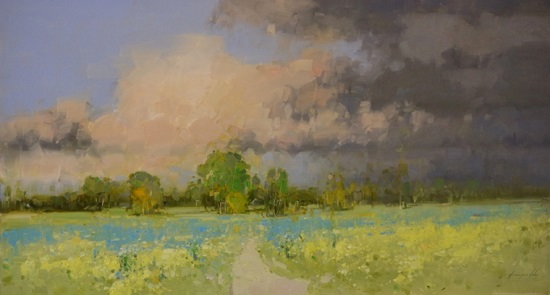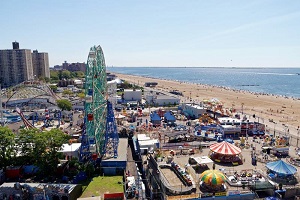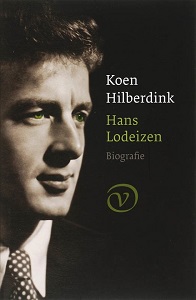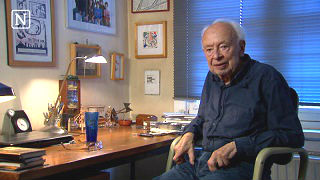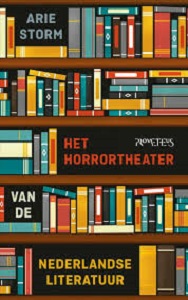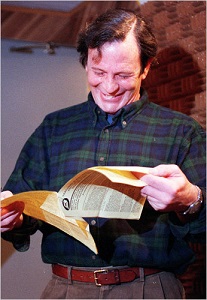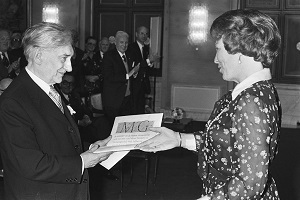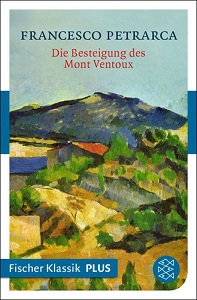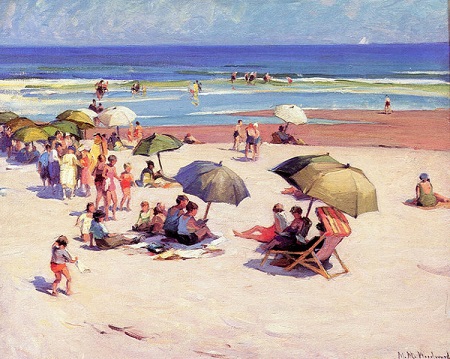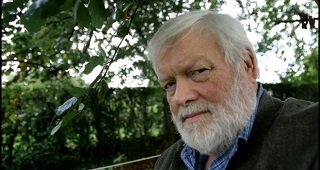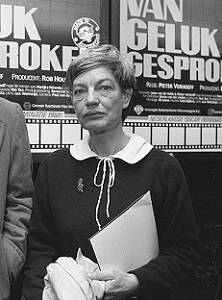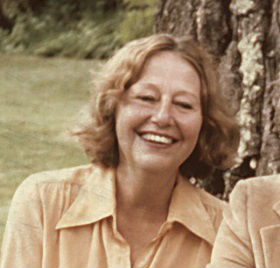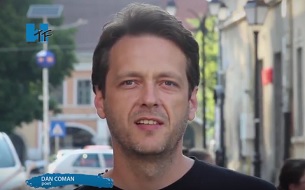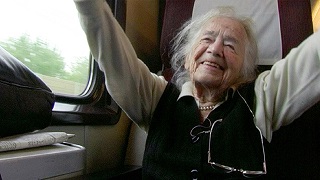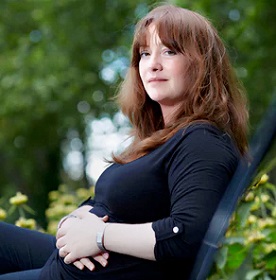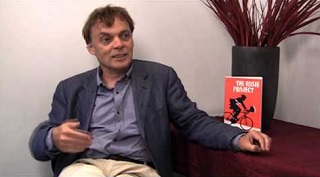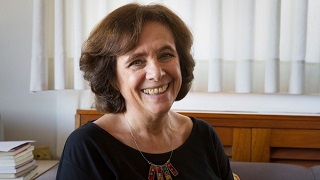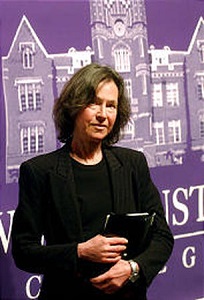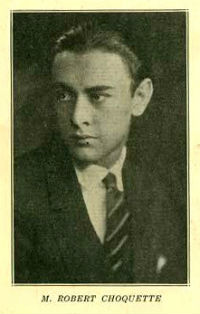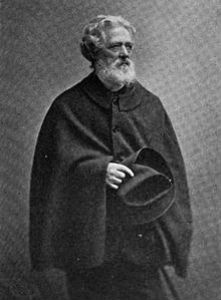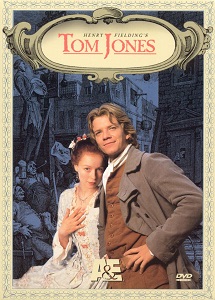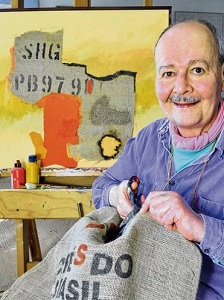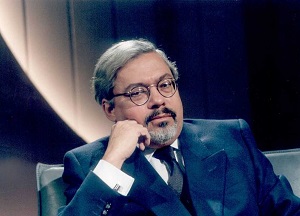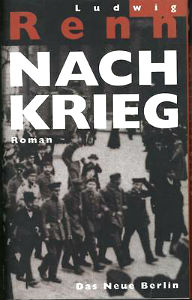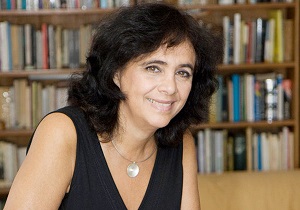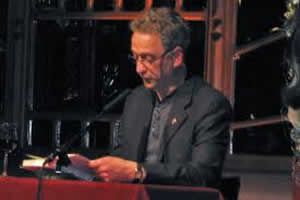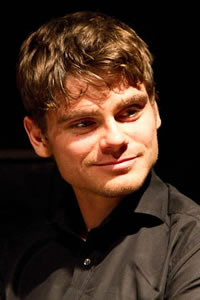De Argentijnse dichteres en schrijfster Ana María Shua werd geboren op 22 april 1951 in Buenos Aires. Zie ook alle tags voor Ana Maria Shua op dit blog.
Uit: Botany of Chaos (Vertaald door Rhonda Dahl Buchanan)
“Romance between Guard and Magnolia
Public square. Guard in love with Magnolia (secretly, even to himself). City budget cuts. Guard transferred to office job. Magnolia languishes. Guard languishes. Pathetic nocturnal encounters. With each passing day, Magnolia blossoms. Rumors in the neighborhood. One night, tragic premature birth: offspring buried discreetly. At the site, noticeable growth of a rebellious misfit sapling who refuses to remain tied to his roots, hates to study, and sits on the curb guzzling beer.
Beware of Women
That a woman has no roots (or pretends not to have them) is not enough proof. I would pay attention to what she eats, how she greets others (a certain flexibility in her curtsies). I would approach her to see if her sighs smell like the wind, if she has tangles like nests in her luxuriant hair. Clever, hybrid species that flitter between two kingdoms, these deceitful women disguise themselves, seduce, pretend to love, and reproduce at the slightest provocation.”

Ana María Shua (Buenos Aires, 22 april 1951)
De Amerikaanse dichteres, essayiste en schrijfster Louise Elisabeth Glück werd geboren op 22 april 1943 in New York. Zie ook alle tags voor Louise Glück op dit blog.
The Racer’s Widow
The elements have merged into solicitude,
Spasms of violets rise above the mud
And weed, and soon the birds and ancients
Will be starting to arrive, bereaving points
South. But never mind. It is not painful to discuss
His death. I have been primed for this –
For separation – for so long. But still his face assaults
Me; I can hear that car careen again, the crowd coagulate on
asphalt
In my sleep. And watching him, I feel my legs like snow
That let him finally let him go
As he lies draining there. And see
How even he did not get to keep that lovely body.
Elms
All day I tried to distinguish
need from desire. Now, in the dark,
I feel only bitter sadness for us,
the builders, the planers of wood,
because I have been looking
steadily at these elms
and seen the process that creates
the writhing, stationary tree
is torment, and have understood
it will make no forms but twisted forms.
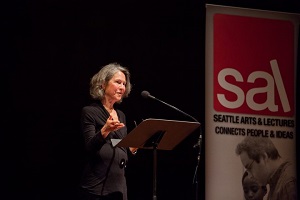
Louise Glück (New York, 22 april 1943)
De Duitse dichter, graficus en illustrator Gert W. Knop werd geboren op 22 April 1943 in Darmstadt.Zie ook alle tags voor Gert W. Knop op dit blog.
Früher Sommertag
Das Leben,
ewiges Karussell der Ereignisse,
wie einsame Fahrten
auf endloser See.
Der Tag im Wandel
ergießt seine Blüten
zum nahenden Sommer.
Jetzt, im Windhauch,
der betörende Duft das Jasmins,
der sich auf Gras und Bäume
legt im nahen Park.
Vergessen ist die Zeit der Stille,
und der dunklen, vergangenen Tage
im Glanz einer neuen Sonne
mit den Regenbogenfarben
der Seele
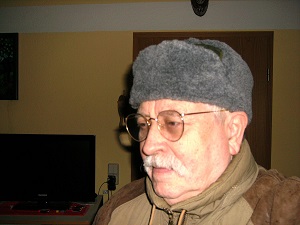
Gert W. Knop (Darmstadt, 22 April 1943)
De Canadese dichter, schrijver en diplomaat Robert Choquette werd geboren op 22 april 1905 in Manchester, New Hampshire. Zie ook alle tags voor Robert Choquette op dit blog.
Uit: En Marge de Dürer
J’AS feuilleté longtemps un album de Dürer,
Ce vieux maître allemand qui, extirpant de l’ombre
La conscience humaine aux racines sans nombre,
Grava dans la clarté le profil de l’enfer.
Et ces feuillets vivants que le détail torture,
Et ces traits corrosifs, aigus, rongeurs, pillards,
Dont le burin-scalpel mutile la nature,
Ont fait monter en moi ce mystique brouillard
Troué de cent clochers que fut le moyen âge;
Et je rêve, et voici que je vois en mes yeux,
Sur un chemin qui tient de la terre et des cieux,
Prendre forme et grandir des spectres en voyage.
D’abord l’Orgueil, masqué de son sourire amer.
Fils aîné de Satan, qu’il provoque de taille,
Il chevauche un lion ému pour la bataille.
Sa pensée orageuse est pareille à la mer,
Mais, fluide serpent qui se glisse en spirale
Aux ramures, le vent n’a jamais pris au vol
Ses plaintes. Le coeur haut comme une cathédrale,
Il passe, et le lion, d’un coup de griffe au sol,
Écrit sur tout chemin: « C’est le maître qui passe.
Une ombre de l’enfer le suit: le Désespoir,
Étouffant à deux mains l’oeil qui ne sait plus voir
Le bleu visage de l’espace.
Après lui vient l’Envie au sourire amaigri,
Au pied feutré, au front étroit, au regard jaune.
C’est elle qui mesure à l’aune Le bien d’autrui.
Son sein, qui n’a jamais fleuri,
Nourrit avec douleur la fille de ses oeuvres,
La Calomnie au profil d’ange et dont le corps
Dérobe en son manteau l’ondoiement des couleuvres.
Un autre nourrisson, plus redoutable encor,
Dévoré d’une soif aux flammes de Géhenne,
Aspire au maigre sein qu’il n’a jamais tari;
Et quand la mère, ouvrant sa bouche avec un cri,
L’appelle par son nom, l’écho répond: la Haine.
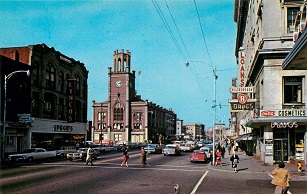
Robert Choquette (22 april 1905 – 22 januari 1991)
Manchester, New Hampshire in de Jaren 1960
De Engelse dichter James Philip Bailey werd geboren op 22 april 1816 in Nottingham. Zie ook alle tags voor James Philip Bailey op dit blog.
The Passing Bell
Hark! ’tis the passing bell;
While the soul is on its way,
While it waves its upward wings,
We yet may pray.
Pray for the good man’s soul;
He is leaving earth for heaven;
And it soothes us to feel that the best
May be forgiven.
Pray for the sinful soul;
It fleëth we know not where;
But wherever it be, let us hope;
For God is there.
Pray for the rich man’s soul;
Not all be unjust, nor vain;
The wise he consoled; and he saved
The poor from pain.
Pray for the poor man’s soul;
The death of this life of ours,
He hath shook from his feet; he is one
Of the Heavenly powers.
Pray for the old man’s soul;
He hath laboured long; through life
It was battle, or march; he hath ceased,
Serene, from strife.
Pray for the infant’s soul;
With his spirit’s crown unsoiled,
He hath won, without war, a realm;
Gained all, nor toiled.
Pray for the struggling soul;
The mists of the straits of death
Clear off; in some star–bright isle
It anchoreth.
Pray for the soul assured;
Though it wrought in a gloomy mine,
Yet the gems it earned were its own,
That soul divine.
Pray for the simple soul;
For it loved, and therein was wise,
Though itself knew not; but with Heaven
Confused the skies.
Pray for the sage’s soul;
‘Neath his welkin wide of mind,
Lay the central thought of God,
Though undefined.
Pray for the high, the mean;
Souls are of equal birth;
Let thoughts be the joy of the world,
And end of earth.
Pray for the souls of all,
To God, and His holy Son,
That, filled with the Spirit Divine,
All may be one.
Hush! for the bell hath ceased;
And the spirit’s fate is sealed;
To the angels known; to man
Left unrevealed.
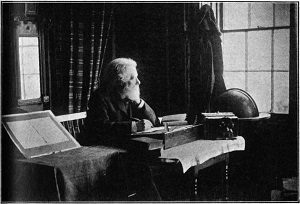
James Philip Bailey (22 april 1816 – 6 september 1902)
In zijn studeerkamer
De Engelse schrijver Henry Fielding werd op 22 april 1707 in Glastonbury geboren. Zie ook alle tags voor Henry Fielding op dit blog.
Uit: Tom Jones
“Thwackum was likewise pretty assiduous in his visits; and he too considered a sick-bud to be a convenient scene for lectures. His style however, was more severe than Mr Allworthy’s: he told his pupil, that he ought to look on his broken limb as a judgment from heaven on his sins. That it would become him to be daily on his knees, pouring forth thanksgivings that he had broken his arm only, and not his neck; which latter, he said, was very probably reserved for some future occasion, and that, perhaps, not very remote. For his part, he said, he had often wondered some judgment had not overtaken him before; but it might he perceived by this, that divine punishments, though slow, are always sure. Hence likewise he advised him to foresee, with equal certainty, the greater evils which were yet behind, end which were as sure as this, of overtaking him in his state of reprobacy. “These are,” said he,” to be averted only by such a thorough and sincere repentance, as is not to be expected or hoped for, from one so abandoned in his youth, and whose mind, I am afraid, is totally corrupted. It is my duty, however, to exhort you to this repentance, though I too well know all exhortations will be vain and fruitless. But liberavi animam meam. I can accuse my own conscience of no neglect ; though it is, at the same time, with the utmost concern I see you travelling on to certain misery in this world, and to as certain damnation in the next.” Square talked in a very different strain: he said, such accidents as a broken bone were below the consideration of a wise man ; that it was abundantly sufficient to reconcile the mind to any of these mischances, to reflect that they are liable to befal the wisest of mankind, and are undoubtedly for the good of the whole. He said, it was a mere abuse of words, to call those things evils, in which there was no moral unfitness: that pain, which was the worst consequence of such accidents, was the most contemptible thing in the world: with more of the like sentences, extracted out of the second book of Tully’s Tusculan questions, and from the great Lord Shaftesbury. In pronouncing these he was one day so eager, that he unfortunately bit his tongue; and in such a manner, that It not only put an end to his discouree, but created much emotion in him, and caused him to mutter an oath or two: but what was worst of all, this accident gave Thwackunt, who was present, and who held all such doctrine to be he-thenish and atheistical, an opportunity to clap a judgment on his back. Now this was done with so malicious a sneer, that it totally unhinged (if I may so say) the temper of the philosopher, which the bite of his tongue had somewhat ruffled; and so he was disabled from venting his wrath at his lips, he had possibly found • more violent method of revenging himself; had not the surgeon, who was then luckily in the room, contrary to his own interest, interposed, and Preserved the peace.”
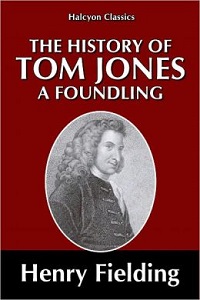
Henry Fielding (22 april 1707 – 8 oktober 1754)
Cover
De Duitse schrijver en vertaler Michael Schulte werd geboren op 22 april 1941 in München. Zie ook alle tags voor Michael Schulte op dit blog. Zie ook alle tags voor Michael Schulte op dit blog.
Uit: Die Flaschenpost des Herrn Debussy
„Ein Haus am Meer, das war immer mein Traum gewesen. Nun wohne ich unweit der Ostsee, ich kann sie vom Garten aus so-gar sehen, aber die Ostsee ist kein Meer, sondern eine leicht salzhaltige Pfütze. Da schäumt und brodelt nichts, auch Knut Hamsun hat sich über die Ostsee immer abfällig geäußert Ich muss ihm Recht geben. Die Ostsee ist wie eine Bockwurst, die ein Rumpsteak sein möchte. Einmal hätte ich beinahe ein Haus mit eigener Bucht an der Pazifikküste gekauft, in Oregon, USA. In letzter Sekunde fiel mir jedoch auf, dass alle Häuser in dieser Gegend zu verkaufen waren. Der Makler behauptete zwar, das habe nichts zu bedeu-ten, doch ich wurde misstrauisch, irgendetwas war da faul, der Bau eines Atomkraftwerks oder einer sechsspurigen Auto-bahn, ich wusste es nicht. Meine damalige Ehefrau, eine aus Chicago stammende Anthropologin, zeterte: »Let’s buy this home, honey«, aber ich blieb hart. Dann doch lieber die Ost-see, wo Windräder die Landschaft verschandeln, viel Lärm ab-sondern und gerade genug Strom erzeugen, um ein Frühstücks-ei zu kochen. Vielleicht gelingt es mir doch noch, ein Haus am Meer zu beziehen. Ich habe ein langes Leben zu gewärtigen, mein Hausarzt macht mir Mut — außer einer Herzschwäche, zu hohem Blutdruck, einer angeschwollenen Leber, ein wenig schwachen Nieren, der Milz, na ja, halb so wild, und kaum noch reduzierbarem Übergewicht sei alles in bester Ordnung. Ich müsse nur ordentlich Sport treiben und mich viel bewegen, um meinen Niedergang und die endgültige Verblödung aufzu-halten. Sport habe ich mein Lebtag verabscheut, und ich werde damit jetzt nicht anfangen. Außerdem, welchen Sport? Fußball — dazu bin ich zu alt. Handball — ich hatte noch nie einen Ball fangen können. Kugelstoßen, Hochsprung — unmöglich. Ten-nis — die meisten Tennisspieler sind mir unsympathisch. Golf—das wäre was, aber es gibt hier im Umkreis von hundert Kilo-metern keinen Golfplatz. Also bleibe ich auf meinem Bett lie-gen, sehe mir schlechte Fernsehsendungen an, die alten ameri-kanischen Serien, Perry Mason zum Beispiel, Perry Mason, der Anwalt, der nie verliert und der immer das Glück hat, dass der Mörder im Gerichtssaal sitzt, um von ihm entlarvt zu wer-den. Oder Jerry Cotton, unglaublich schlechte deutsche Filme aus den sechziger Jahren, noch schlechter als die Edgar-Wal-lace-Filme, in denen Klaus Kinski immer den spielt, von dem der Zuschauer annehmen soll, er sei der Mörder. Wenn im Fernsehen nichts Ordentliches läuft, wenn meine Haushälterin mich nicht zwingt, mit ihr an der blöden Ostsee spazieren zu gehen oder die Enten zu flittern oder die Fensterrahmen zu streichen oder den Rasen zu mähen, bleibe ich auf dem Bett liegen und höre klassische Musik und lese; am liebsten Bio-grafien. Am liebsten Biografien über Menschen, die ich gerne gekannt hätte, Orson Welles etwa oder Eddie Constantine, Anna Magnani, Erich Mühsam, Franziska zu Reventlow, Egon Friedell oder Erik Satie.“
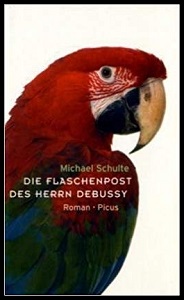
Michael Schulte (München, 22 april 1941)
Cover
De Cubaanse schrijver Guillermo Cabrera Infante werd geboren op 22 april 1929 in Gibara, Cuba. Zie ook alle tags voor alle tags voor Guillermo Cabrera Infante op dit blog.
Uit: Drei traurige Tiger (Vertaald door Wilfried Böhringer)
“Showtime! Meine Damen und Herren. Ladies and Gentlemen. Einen wunderschönen Abend Ihnen allen, meine Damen und Herren. Good evening, Ladies and Gentlemen. “Tropicana”, der FABELhafteste Nachtclub der Welt. “Tropicana”, the most fabulous nightclub in the WORLD…präsentiert…presents…seine neue Revue…its new show…in der Künstler von kontinentalem Ruhm…where performers of continental fame …Sie alle mitnehmen werden…will take you all…to the wonderful world of supernatural beauty of the Tropics…in die wunderbare, außergewöhnliche und herrliche Welt der Tropen. Die Tropenwelt für Sie, liebe Landsleute (….) Herzallerliebstes Publikum, Volk Kubas, dieses allerschönsten Landes, entschuldigen Sie mich für einen Augenblick, während ich mich in der Sprache Shakespeares, in English, an die erlesenen Besucher wende, die bis zum allerletzten Platz diese Hochburg der Liebe und der Lebensfreude füllen. Ich möchte mich, wenn es mir die sprichwörtliche Liebenswürdigkeit der hochverehrten kubanisches Publikums erlaubt, an unsere RIIIIEsige amerikanische Besucherschar wenden: an die ehrenwerten und strahlenden Touristen, die das Land der gay senyoritas and brave caballerros besuchen … WelCOME to Cuba!”
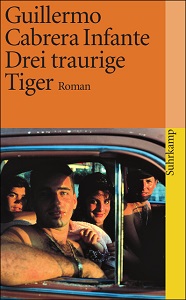
Guillermo Cabrera Infante (22 april 1929 – 21 februari 2005)
Cover
De Duitse schrijver Ludwig Renn (eig. Arnold Friedrich Vieth von Golßenau) werd geboren op 22 april 1889 in Dresden. Zie ook alle tags voor Ludwig Renn op dit blog.
Uit: Nachkrieg
„Als er fortgegangen war, fragte ich den Unterwachtmeister Kroll: „Was ist denn das für einer, der Alte?”
„Ach, der ist wie alle.” Dazu zog er einen Mund, als ob er sehr wenig von ihm hielte.
Am nächsten Tage erfuhr ich durch Herumfragen, dass im Lager zwei ganze Reichswehrregimenter lagen und außerdem die ersten Anfänge von zwei Polizeiregimentern. Freilich hießen die nicht Regimenter, sondern Gruppen. Die Bataillone hießen Abteilungen und die Kompanien Hundertschaften. Sonst aber waren wir genauso organisiert wie das Militär, hatten Maschinengewehre und sogar Artillerie und Kavallerie. Nur wurden wir mit Herr angeredet und waren Beamte.
Die Offiziere kümmerten sich gar nicht um uns. Sie hatten bei altgedienten Polizeiwachtmeistern Unterricht im Polizeidienst, denn sie waren ehemalige Offiziere der Armee und mussten natürlich auch erst ihren neuen Dienst lernen. In den Stuben, nicht nur bei unserer Hundertschaft, wurde ausgiebig über unsere Organisationsart diskutiert. Einige waren damit gar nicht einverstanden. Sie sprachen es nicht deutlich aus, aber es stand hinter ihren Reden: sie sahen hier, dass wir nicht nur eine harmlose Polizei werden sollten, die dazu da ist, Pilzsucher zu verscheuchen und auf Ordnung in den Straßen zu halten, sondern eine Bürgerkriegsarmee gegen die Arbeiterschaft. Diese Stimmung war anfangs durchaus nicht allgemein, wurde aber durch zwei Vorkommnisse sehr gefördert.
In den ersten Tagen nach meinem Eintreffen kam täglich ein großer Schub von Neugeworbenen an. Am vierten kamen nur zwei. Am Tage darauf gar niemand mehr. Der Ersatz stockte vollkommen.
Der Hauptmann sprach mit dem Hauptwachtmeister darüber, woher das nur käme. Wir wussten es alle, aber keiner hatte Lust, es zu sagen. Am 13. Januar war in Berlin vor dem Reichstag eine riesige Demonstration gegen das Betriebsrätegesetz auseinander geschossen worden. Vierzig Tote und hundert Verwundete sollte es gegeben haben. Und am Tage darauf war der Belagerungszustand über das ganze Reich verhängt worden. Wir waren uns zwar über das Betriebsrätegesetz nicht klar, aber bei der Aussicht, auf frühere Arbeitskollegen schießen zu müssen, ließ sich niemand für die Polizei anwerben. Daher stockte der Ersatz.”
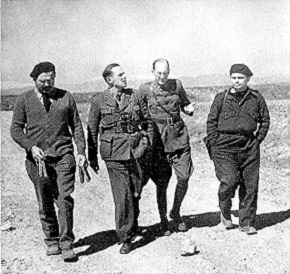
Ludwig Renn (22 april 1889 – 21 juli 1979)
V.l.n.r. Ernest Hemingway, Hans Kahle, Ludwig Renn en Joris Ivens bij de Internationale Brigades in 1937 in de buurt van Madrid






